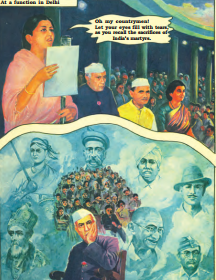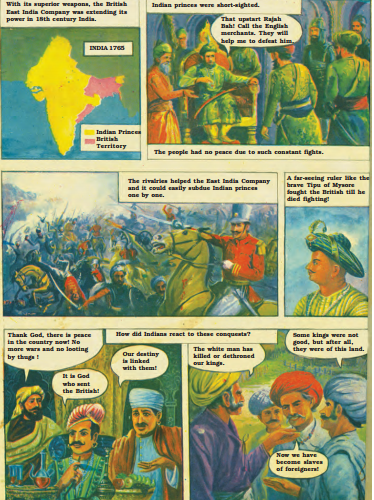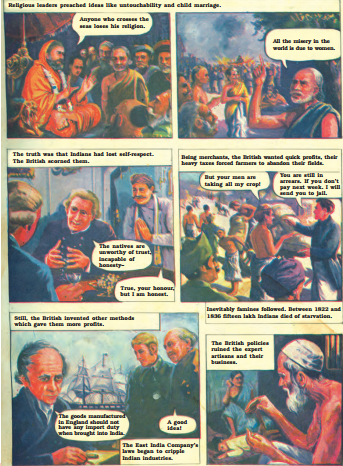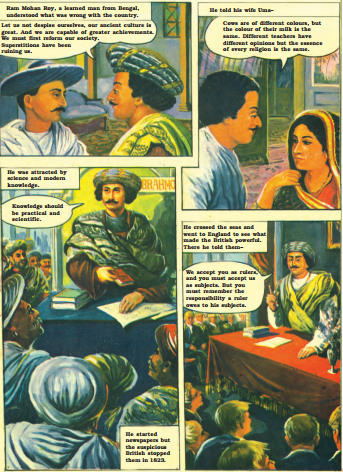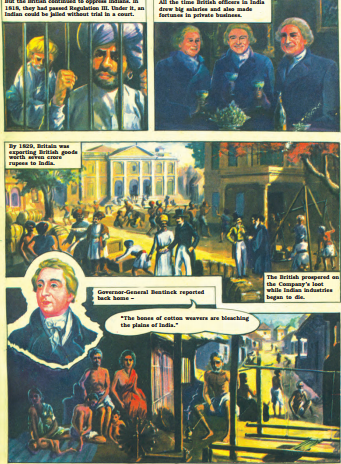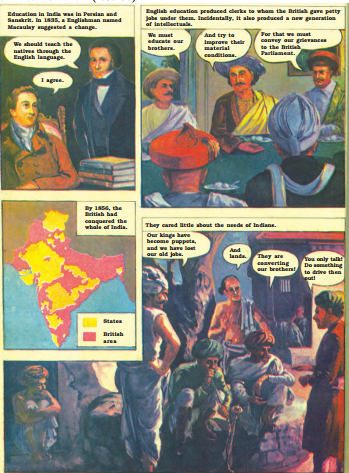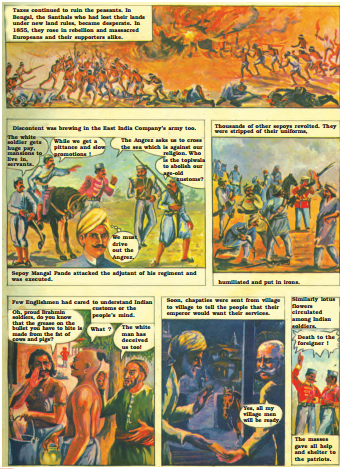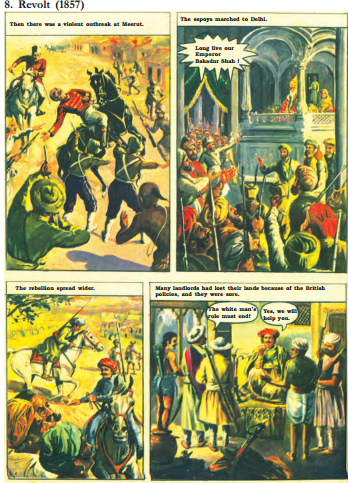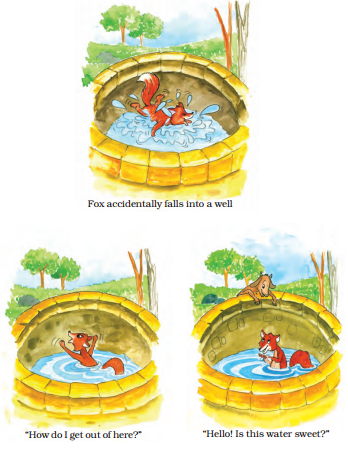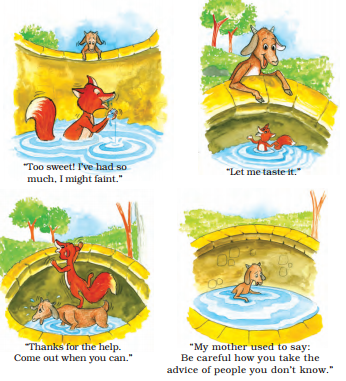Table of Contents
3
Glimpses of the Past
Before you read
Here are some pictorial glimpses of the history of our country from 1757 to 1857. These pictures and ‘speech bubbles’ will help clarify your understanding of the conditions that led to the event known as the First War of Independence in 1857.
1. the martyrs
2. The Company’s conquests (1757-1849)
3. British Rule (1765-1836)
4. Ram Mohan Roy (1772-1833)
5. oppression (1765-1835)
6. Dissatisfaction (1835-56)
7.the sparks (1855-57)
Comprehension Check
1. Look at picture 1 and recall the opening lines of the original song in Hindi. Who is the singer? Who else do you see in this picture?
2. In picture 2 what do you understand by the Company’s “superior weapons”?
3. Who is an artisan? Why do you think the artisans suffered? (picture 3)
4. Which picture, according to you, reveals the first sparks of the fire of revolt?

Answer the following questions.
1. Do you think the Indian princes were short-sighted in their approach to the events of 1757?
2. How did the East India Company subdue the Indian princes?
3. Quote the words used by Ram Mohan Roy to say that every religion teaches the same principles.
4. In what ways did the British officers exploit Indians?
5. Name these people.
(i) The ruler who fought pitched battles against the British and died fighting.
(ii) The person who wanted to reform the society.
(iii) The person who recommended the introduction of English education in India.
(iv) Two popular leaders who led the revolt (Choices may vary.)
6. Mention the following.
(i) Two examples of social practices prevailing then.
(ii) Two oppressive policies of the British.
(iii) Two ways in which common people suffered.
(iv) Four reasons for the discontent that led to the 1857 War of Independence.

In comics what the characters speak is put in bubbles. This is direct narration. When we report what the characters speak, we use the method of indirect narration.
Study these examples.
First farmer: Why are your men taking away the entire crop?
Second farmer: Your men have taken away everything.
Officer: You are still in arrears. If you don’t pay tax next week, I’ll send you to jail.
The first farmer asked the officer why his men were taking away the entire crop.
The second farmer said that their men had taken away everything.
The officer replied that they were still in arrears and warned them that if they did not pay tax the following week, he (the officer) would send them (the farmers) to jail.
1. Change the following sentences into indirect speech.
(i) First man: We must educate our brothers.
Second man: And try to improve their material conditions.
Third man: For that we must convey our grievances to the British Parliament.
The first man said that ______________________________________________ ___________________________________________________________________
The second man added that _______________________________________ ___________________________________________________________________
The third man suggested that ________________________________________ ___________________________________________________________________
(ii) First soldier: The white soldier gets huge pay, mansions and servants.
Second soldier: We get a pittance and slow promotions.
Third soldier: Who are the British to abolish our customs?
The first soldier said that ___________________________________________ ___________________________________________________________________
The second soldier remarked that __________________________________
__________________________________________________________________
The third soldier asked __________________________________________
_________________________________________________________________

1. Playact the role of farmers who have grievances against the policies
of the government. Rewrite their ‘speech bubbles’ in dialogue form first.
2. Look at the pictures.
(i) Ask one another questions about the pictures.
Where is the fox? How did it happen?
What is the fox thinking? Who is the visitor?
What does she want to know? What is the fox’s reply?
What happens next? Where is the goat?
Where is the fox now? What is the goat thinking?
(ii) Write the story in your own words. Give it a title.
______________________________________________________________
______________________________________________________________
3. Read the following news item.
History becomes fun at this school
Mumbai: Students in the sixth grade of a certain school in Navi Mumbai love their history lessons thanks to a novel teaching aid. It is not surprising given the fact that their study material includes comic books and they use their textbooks for reference to put things into perspective. Besides, students are encouraged to tap other sources of information as well. During history classes, students pore over comic strips of historical periods, enact characters of emperors and tyrants, and have animated discussions on the subject. History has become fun.
In the class students are asked to read the comic strip aloud, after which they break up into groups of four, discuss what they have heard and write a summary. Each group leader reads his group’s summary aloud and the whole class jumps into discussion and debate, adding points, disagreeing and qualifying points of view. A sixth grade student says, “It’s a lot of fun because everyone gets a chance to express themselves and the summary takes everyone’s ideas into account.”
According to the school principal the comic strip format and visuals appeal to students. A historian feels that using comics in schools is a great idea. Comics and acting help students understand what characters in the story are actually thinking.
(adapted from The Times of India, New Delhi, October 2007)
Based on this news item, write a paragraph on what you think about this new method of teaching history.
4. Find the chapters in your history book that correspond to the episodes and events described in this comic. Note how the information contained in a few chapters of history has been condensed to a few pages with the help of pictures and ‘speech bubbles’.
5. Create a comic of your own using this story.
Once the Sun and the Wind began to quarrel, each one saying that he was stronger than the other. At last they decided to test each other’s strength. A man with a cloak around his shoulders was passing by. The Wind boasted, “Using my strength I can make that man take off the cloak.” The Sun agreed. The Wind blew hard. The man felt so cold that he clasped his cloak round his body as tightly as possible.


His coat is dusty from neglect, his whiskers are uncombed.
He sways his head from side to side, with movements like a snake;
And when you think he’s half asleep, he’s always wide awake.
Macavity, Macavity, there’s no one like Macavity,
For he’s a fiend in feline shape, a monster of depravity.
You may meet him in a by-street, you may see him in the square —
But when a crime’s discovered, then Macavity’s not there!
T.S. Eliot

defy:
disobey or resist openly
Scotland Yard:
the headquarters of the London police force
Flying Squad:
a group of police or soldiers ready to move into action quickly
levitation:
floating in the air without support
fiend:
devil
feline:
of, or relating to, a cat
depravity:
moral corruption

1. Read the first stanza and think.
(i) Is Macavity a cat really?
(ii) If not, who can Macavity be?
2. Complete the following sentences.
(i) A master criminal is one who ___________________
(ii) The Scotland Yard is baffled because ___________________
(iii) ___________________ because Macavity moves much faster than them.
3. “A cat, I am sure, could walk on a cloud without coming through”.
(Jules Verne)
Which law is Macavity breaking in the light of the comment above?
4. Read stanza 3, and then, describe Macavity in two or three sentences of your own.
5. Say ‘False’ or ‘True’ for each of the following statements.
(i) Macavity is not an ordinary cat.
(ii) Macavity cannot do what a fakir can easily do.
(iii) Macavity has supernatural powers.
(iv) Macavity is well-dressed, smart and bright.
(v) Macavity is a spy, a trickster and a criminal, all rolled in one.
6. Having read the poem, try to guess whether the poet is fond of cats. If so, why does he call Macavity a fiend and monster?
7. Has the poet used exaggeration for special effect? Find a few examples of it and read those lines aloud.
Rick: What did Papa Firefly tell Mama Firefly?
Hick: I don’t know.
Rick: Isn’t our child bright for his age!
Mary: Why isn’t a nose twelve inches long?
Jo: I don’t know. Why?
Mary: Because if it was twelve inches long it would be
a foot.
Anita: I got a hundred in school today.
Mother: That’s wonderful. What did you get a hundred in?
Anita: Forty in Maths and sixty in English.

